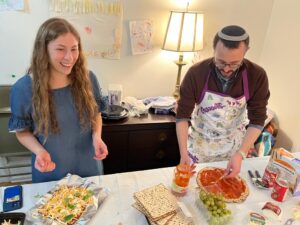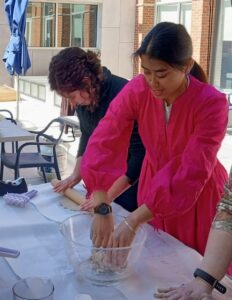Rutgers students threw white balls at each other yelling “barad!”(hail), did the wave around the table, and hit each other with scallions – all in the name of Pesachpalooza, JLIC’s creative spin on the traditional Mock Seder. It’s a small example of JLIC’s greater innovative approach in engaging the 5,000 students it served across North America and Israel this past Pesach.
“As someone who didn’t become observant until college, JLIC’s mock seder gave me a chance to see how lively the seder can be with family traditions. It was also helpful to have a refresher right before the holiday starts”, said Brooke Ramos, a Rutgers participant at JLIC’s Pesachpalooza.
JLIC Directors across 27 campuses were busy teaching pre-Pesach classes, fielding questions of how to kasher a dorm room and sell chametz. While the majority of students return home for Passover, over 2,000 students remain on campus. For these students, JLIC Directors hosted large communal seders on the first days, barbecues in the intermediate days, and seemingly endless meals on the last days. JLIC’s mission was to take care of every Jewish student’s dietary and spiritual needs on Passover.
A few days before the holiday, JLIC Director Rabbi Aryeh Kaplan of UCLA said, “We just ordered 700 meals for Yom Tov. I am sure we will have more”.
The seder often becomes a source of community outreach, attracting Jews from all denominations. “We helped guide several students to observe Passover for the first time”, said JLIC Director of Greater Atlanta, Rabbi Ben Atwood.
Binghamton’s JLIC Directors Rabbi Ben and Ellie Menora hosted students who had never before experienced an Orthodox Seder. “The seder ran from 8:30PM until 1:45AM, and when we mentioned that we do this the second night as well- they ALL asked to come back again- and showed up the following night for another 5 hour Seder!”
Rabbi Joshua Klein of JLIC at Penn, who runs a large seder at Hillel, an intimate seder in his house, and a gimmicky “matzah pizza factory”, saw the impact of creating a warm home away from home. “We had a student named Michael”, he said. “It was his first time having a seder outside the land of Israel and he was worried that he wouldn’t have a place to go. He had such a good time that he came for a second seder, which he had actually never done before.”
Campuses also took care of global Jewish communal needs. Last year, JLIC of Greater Atlanta, NYU and Columbia/Barnard raised funds to cover Passover expenses for Jewish families taking refuge in Czernowitz, Ukraine. A student who’s mother is from Czernowitz was particularly moved and sent a letter thanking the JLIC community.
JLIC of UMass Amherst and Johns Hopkins tapped into their unique campus populations and incorporated hands on Sephardi traditions to engage students. At Umass, a Moroccan student named Ariel Lutati, along with his mother’s help, cooked up a feast of traditional delicacies for a Mimouna, the post-Passover holiday celebration. Johns Hopkins partnered up with Syrian students on campus for “Non-Ashkenormative” Haroset making, whipping up three different traditional sephardic haroset recipes.
JLIC students at Yale University rolled up their sleeves to bake fresh matzah. “We got shmurah matzah flour, filled jugs of water before nightfall in accordance with the halacha, did a crash course on the halachot of matzah baking, and got those babies done in under 18 minutes!” said JLIC Director Rabbi Alex Ozar. “It was almost all first timers, and people were excited to do the mitzvah with their own hands”.
One campus felt the words of the Haggadah come to life. “Eruv Yuntif there was a storm that came through Chicago, so a bunch of students who were unable to make their flights were left stranded hours before the holiday began”, said Rabbi Yehudah Auerbach, JLIC Director of the University of Chicago.
“They reached out to us at the last second asking if we could host them for Sedarim, and it was beautiful. We truly felt the words of ‘All who are hungry, let them come and eat. All who are in need, let them come celebrate Passover with us.’ “

